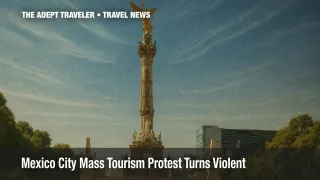Mexico City Mass Tourism Protest Turns Violent, Shaking Traveler Hotspots

Mexico City's fashionable Condesa and Roma neighborhoods-long magnets for cafés, culture, and Airbnb-hopping foreigners-exploded in frustration on July 4 when hundreds marched against what organizers called a Mexico City mass tourism protest. A peaceful rally morphed into window-smashing and tourist harassment, underscoring mounting local anger over skyrocketing rents and a cultural squeeze blamed on digital nomads. Travelers eyeing the capital this summer should understand why tempers flared and how new rules may affect their stay.
Key Points
- Protest drew several hundred in Condesa, Roma, and Parque México.
- Violence: storefronts looted; tourists verbally harassed.
- Why it matters: renters report 40 %-60 % hikes since 2020, displacing locals.
- City now limits Airbnb listings to 6 months per year.
- Similar anti-tourism actions seen in Barcelona and Venice.
Mexico City Mass Tourism Protest Snapshot - How It Works
Condesa and Roma Norte sit just west of Mexico City's historic center. Post-pandemic, English-speaking digital nomads Mexico City discovered fast Wi-Fi, leafy parks, and rents still below New York or Austin. By 2025, more than 26,000 short-term rentals were listed city-wide, pumping an estimated US $40 million into host pockets yet tightening long-term supply. On Friday, activists gathered in Parque México carrying banners-some burned a Donald Trump effigy-before marching to the U.S. Embassy and through the Metro, chanting "¡Fuera gringos!" ("Gringos out!").
Mexico City Mass Tourism Protest Background - Why It Matters
Tensions trace to early 2020, when U.S. remote workers flooded Mexico City to escape lockdowns and stretch paychecks. Average furnished one-bedroom rates in Roma Norte climbed from roughly 18,000 pesos to 30,000 pesos (about US $1,750) in four years, according to property analysts. Local renters-often earning under US $1,000 monthly-found themselves priced out. Complaints of "neo-colonial" culture surfaced online; street art warned visitors to "leave our homes." In October 2024, the city congress capped Airbnb occupancy at 180 nights per year and barred listings in social-housing blocks-a first bid to curb gentrification in Mexico City.
Mexico City Mass Tourism Protest Latest Developments
A swelling crowd, then shattered glass Protesters gathered at 3 p.m. under light police presence. By dusk, mask-wearing splinter groups smashed boutiques and cafés along Avenida Amsterdam, sending patrons scurrying.
Airbnb limits face early test
City inspectors say new six-month caps take effect this summer. Hosts exceeding 50 % annual occupancy risk losing permits for one year-yet enforcement mechanisms remain vague, and many listings stay unregistered.
What police and city leaders say
Mayor Clara Brugada condemned vandalism but acknowledged housing stress, pledging a task force on rent inflation. Police reported six arrests and minor injuries; no deaths.
Analysis
For travelers, the immediate risk of repeat unrest is low-demonstrations targeted symbols of gentrification, not random visitors. Still, stay alert in Condesa, Roma, and near the U.S. Embassy, especially on weekends when marches often gather. Consider lodging beyond Zone cero del turismo: neighborhoods like Escandón or Coyoacán offer culture at gentler prices and help disperse visitor load. Booking platforms must now disclose permit numbers; choose registered units to avoid last-minute cancellations if authorities crack down. Finally, spend locally-patronize family-run fondas rather than international chains-to ease community tensions and enrich your stay.
Final Thoughts
The Mexico City mass tourism protest is a flashing warning for urban hot spots worldwide: when visitor volume collides with fragile housing markets, backlash follows. Respect local ordinances, support neighborhood businesses, and weigh longer stays over quick drops-in. A little cultural sensitivity can keep your Mexican adventure memorable for the right reasons.
